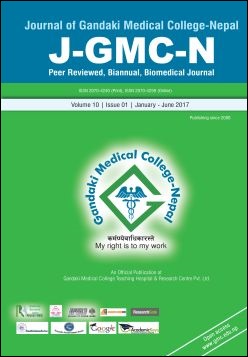A Healthy City Project: A Case Study of Wonju City, South Korea and its Relevance to the Cities in Nepal
DOI:
https://doi.org/10.3126/jgmcn.v10i1.17914Keywords:
Case study, Developing countries, Healthy City, Nepal, WonjuAbstract
Introduction: One of the goals of sustainable development is to make cities inclusive, safe, resilient and sustainable. The healthy city approach is becoming increasingly important in addressing a large number of urban health problems and promoting healthy lifestyles in city dwellers.
Objectives: We performed a case study of the healthy city project in Wonju, South Korea to find out its characteristics and approaches, and to explore its relevance to the cities in Nepal.
Methods: We conducted a case study of the healthy city Wonju project by reviewing relevant published articles and web pages of the city (http://healthycity.wonju.go.kr), alliance for healthy cities, Korean statistical information service and World Health Organization. We also reviewed articles and documents related to healthy cities in South-East Asian countries and Nepal.
Results: The healthy city Wonju project, started in 2004, executed its five-year plan between 2006 and 2010, and is currently running with its 10 year long-term plan (2011- 2020). For its success, Wonju City has been awarded six times by WHO. Recently, Wonju city organized the seventh global conference of the AFHC in August, 2016 in Wonju with the main theme of “our cities, our health, our future”. Key features of the healthy city Wonju project included: Strong political commitment of local government, financing the healthy city initiative with tobacco consumption tax, partnerships with universities, well organized healthy city teams under city administration, coordination with national and regional healthy cities alliance, community participation, and involvement in research for evidence-based planning and evaluation. Nepal, one of the fast urbanizing countries in South-East Asia faces large number of urban health problems.
Conclusions: Though numbers of cities and city dwellers are increasing rapidly, Nepal lacks healthy city projects and networking. The approaches of healthy city Wonju might be useful for developing countries such as Nepal to initiate and develop healthy cities projects in a sustainable way.
Journal of Gandaki Medical College
Vol. 10, No. 1, 2017, page: 34-42
Downloads
1233
1630
Downloads
Published
How to Cite
Issue
Section
License
This license allows reusers to distribute, remix, adapt, and build upon the material in any medium or format for noncommercial purposes only, and only so long as attribution is given to the creator.




